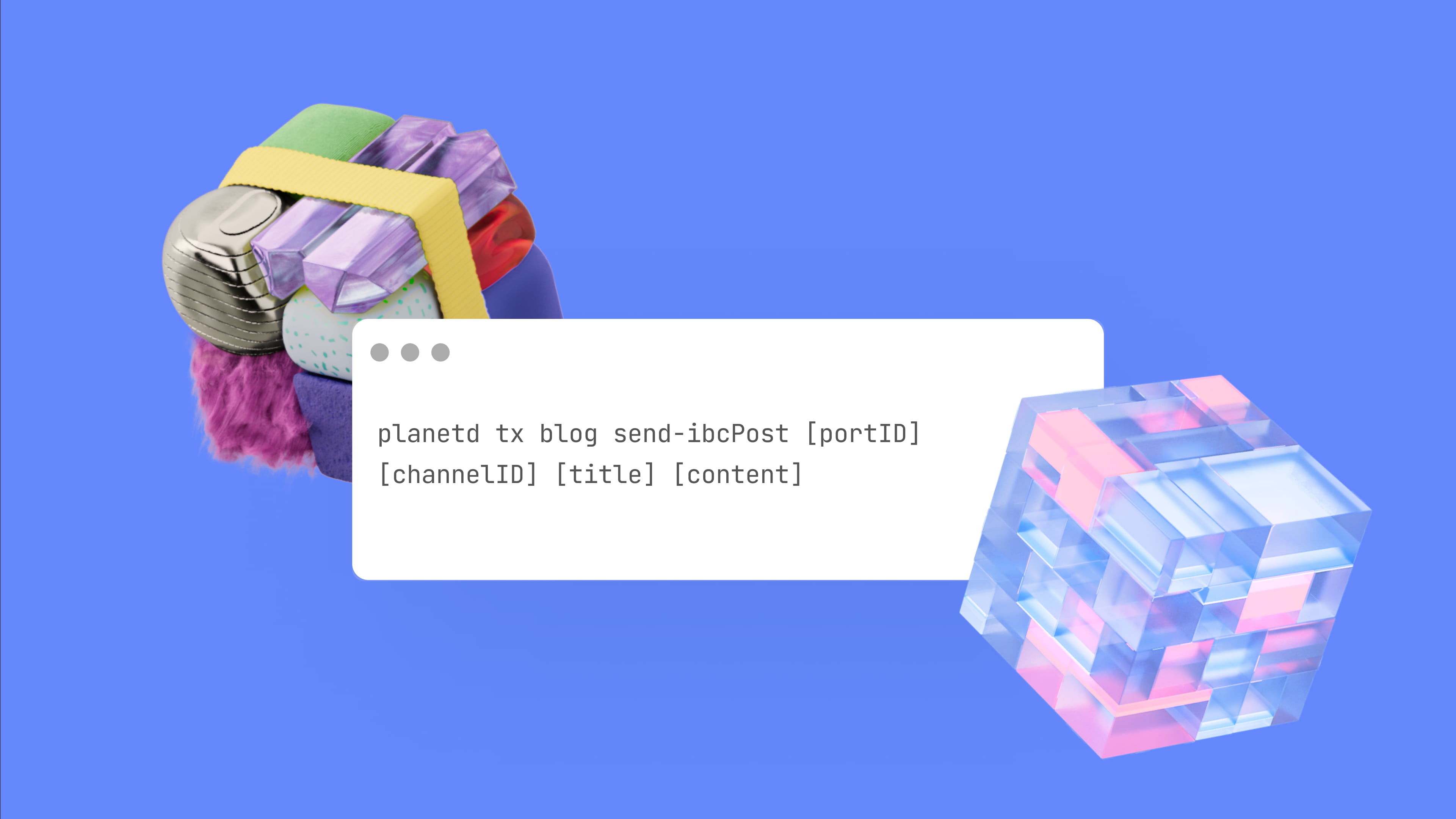
Get expert tips on blockchain development and Ignite CLI updates to give your project a head start.
curl https://get.ignite.com/cli! | bash 
 Sonia Singla
3 min read
Sonia Singla
3 min read

With the expansion of blockchain technology, we're seeing new blockchain protocols taking different approaches to move projects, from the range of hosted applications to the variety of consensus mechanisms. Yet, despite the varying efforts to maximize the usability and scalability of ecosystems, have you ever wondered why blockchain protocols still fail to reach mainstream adoption?
Blockchain protocols like Hyperledger, Multichain, and Corda keep developing to optimize their existing ecosystems without considering the need to communicate cross-chain. Multiple competing protocols have resulted in the creation of separate siloed ecosystems that cannot transfer information or exchange data with each other. If the blockchain space is to grow to accommodate a meaningful number of users, developers must embrace cross-chain technology to scale and strengthen blockchain communication through interoperable application-specific blockchain systems.
The majority of blockchains work independently, which leads to different challenges for developers and users, as single blockchains cannot meet all their requirements. For example, dApp developers on a single base layer like Ethereum compete for throughput and space and may be priced out by rising gas fees and slow transaction times which make the cost of user acquisition prohibitively high. Unless separate blockchains can interoperate, share the load, and scale, we cannot achieve blockchain's full potential. The ability of various different blockchain networks to interconnect directly allows the industry to scale and grow to reach widespread adoption. Interoperability protocols are fast gaining traction allowing blockchains to transact, exchange liquidity and data, and substantially grow their user bases.
Cross-chain technology is essential to elevate the limited capacity of blockchain protocols, speed up the block time, provide high-security transactions, and achieve substantial scalability. The cross-network transfer and sharing of information occurs without downtime and does not generate expensive transaction fees. Cross-chain technology brings immense value to blockchain networks, elevates the user experience, and allows ecosystems to scale. This ability to garner wider user bases and scale in a sustainable way ensures that blockchain technology plays an important role in shaping the future. Interoperability is the foundation of Web 3 and can be achieved only by using cross-chain technology.
Cosmos is the solution for executing cross-chain blockchain transactions. The Cosmos ecosystem relies on the Inter-Blockchain Communication protocol (IBC) that allows independent blockchains to talk to each other. IBC provides the possibility for blockchains to interoperate, transfer tokens and data frictionlessly, and connect with each other confidently.
“You can do practically anything you want with IBC,” says Ignite Director of Product Gautier Marin. “Token transfers, NFTs, cross-chain smart contracts, interchain accounts… IBC lets you build any kind of cross-chain application you want.”
These examples of successful mainnet projects were built using the Cosmos SDK and demonstrate the high value of cross-chain development.
Osmosis is a decentralized exchange (DEX) on the Cosmos network. Osmosis, an IBC integrated automated market maker (AMM), is one of the most important chains built using the Cosmos SDK framework and generated with Ignite CLI. Osmosis uses IBC to enable cross-chain transactions. The Osmosis exchange is fully interoperable with cross-chain asset transactions. Users benefit from the fast, low-cost, frictionless cross-chain transactions of assets.
Sifchain is a cross-chain IBC-enabled DEX that is built with the Cosmos SDK framework. Users can swap and pool between the native $ROWAN token, ERC-20, and Cosmos digital assets. Transactions accomplished using cross-chain technology like IBC are executed with lower cost and more efficiency than is possible by using existing DEXs on Ethereum.
CoinSwap is a decentralized protocol that allows users to directly and privately exchange their coins. CoinSwap is a cross-chain AMM module for dApps in the Cosmos ecosystem. CoinSwap is built on IRISnet (the IRIS Hub), an interchain service hub that was also built using Cosmos SDK. CoinSwap is connected with the Cosmos Hub and provides liquidity for assets that are linked across the different Cosmos chains.
Osmosis, SifChain, and Coinswap are just a few examples of the chains built using the Cosmos SDK framework that uses the decentralized IBC protocol that coexists in the Cosmos ecosystem. Every decentralized exchange has its uniqueness, features, and offerings. Each decentralized exchange offers limitless potential.
Ignite CLI, the most popular blockchain framework, is built using the Cosmos SDK framework that lets developers scaffold a new blockchain, add functionality, generate code, and run nodes in development. By generating boilerplate code, Ignite CLI provides an exceptional developer experience to bridge the gap between the development of traditional web applications and building a blockchain from scratch.
By default, the chains built using Ignite CLI comes with IBC functionality. Cross-chain technology is still emerging and is the only solution for achieving interoperability, scalability, and a flourishing blockchain ecosystem.
Join the ever-growing community of developers today and use Ignite CLI to access all the tools you need to build your application-specific blockchain in minutes. You can engage with the Ignite developer community in the following ways: